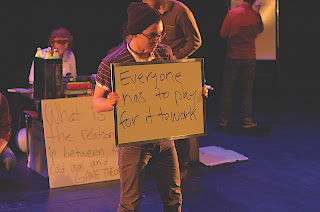dedicated to the revolutions (photo from 2008 Rhubarb Festival)
Small Wooden Shoe (Toronto)’s production of Dedicated to the Revolutions was inspired by a list of seven scientific revolutions, Guttenberg, Copernicus, Newton, Industrial, Darwin, Nuclear and Information, compiled by performer and co-creator Jacob Zimmer’s eighth grade teacher some time ago in Nova Scotia. With curiosity in their hearts and mischief up their sleeves, six Toronto-based performers (Zimmer, Frank Cox-O’Connell, Erin Sheilds, Evan Webber, Chad Dembski, Ame Henderson) demonstrate these scientific marvels in the spirit of an exuberant and hilarious Junior High Science Fair.
Dedicated to the Revolutions is by no means a narrative play and the six performers are essentially playing heightened and performative renditions of themselves as they take the audience into the world of science, as they, a pack of actors, directors and playwrights, understand it, filling every nook and cranny of the stage with action, investigation, experimentation and demonstration. The show begins with an intense game of Jenga, which is also projected onto the back wall of the stage, so that the audience can see, from different angles, as the tower begins to wobble and sway. Invoking the laws of gravity, five of the performers hold the audience completely captivated with their competitive, joyful and playful reactions to the rapidly intensifying game. They keep track of the “toppler” of the tower, in our show it was Frank Cox-O’Connell, on chart paper with a sharpie, and the show begins in earnest.
We learn that while we have been occupied in the theatre, one of the performers, Evan Webber, who was made, roughly, in 1982, was engaged in a race against a printer in the lobby, also made in 1982, to see who could reproduce The Bible faster. Eerily, the Bible stopped on the verse from Chapter 8 of Genesis, “the imagination of man’s heart is evil,” (so if it wasn’t apparent beforehand, apparently we are all going to Hell). Evan did not make it quite so far, not even finishing Chapter 1. This demonstrated, quite clearly, the advances made possible for us from the invention of Guttenberg’s printing press. Next, using tin cans that actually work, the six performers demonstrated the advancements of communication from telephone lines to the Internet, and sang us two different songs to help us remember the order of the keys on a keyboard.
If I gave you a basic description of this show it might sound dreadfully boring and technical, but it is, in fact, the very opposite. All the demonstrations, using everything from skipping ropes to beach balls, are reminiscent of an exhibit one might find at the Discovery Centre, the ones that are designed for children but that adults always seem to make excuses to play on in the name of “learning” (or sometimes “teaching”). What also works in this show’s favour is the ensemble. There is a perceptible sense of camaraderie and friendship on this stage, which is palpable from the moment they begin to play Jenga together. This immediately endears the audience to them and urges them to want to play along too. None of their lines seem entirely scripted, so in the spirit of Improvisation, they are, in fact always playing, which manifests in the ability to discover jokes as they emerge organically from the action and to be able to make each other laugh. The humour and playful irreverence for science is what truly ties this play together. At times rambling on tirades of stream of consciousness, drawing pictures of random association, feeding off one other and adding dry, sarcastic epitaphs that undercut all that has gone before, nothing is taken seriously or held as solemn or truth.
I was also fascinated by the mixture of various technologies used in this show, which mirror the vast array of time periods that are demonstrated throughout the show. At one point a video camera is used to project pieces from the stage onto the back wall, yet at another point, we are shown lightning rods, as depicted by Cox-O’Connell batting two badminton rackets. Erin Sheilds spends a great deal of time at a wipe-out board doing long division, getting the calculations that could have been immediate if they had chosen to use a cell phone, or even a calculator. Yet, what made me so interested, especially in Sheilds, was that the audience was watching her transfixed as she did her long division, filling the board with numbers and careful calculations. I started to wonder if math fascinates us now because it is, so often, an unused skill, like juggling or riding a unicycle. There are so many little gems in this show, the simplistic wisdom like one would expect from a precocious child.
Dedicated to the Revolutions is a fun show, it is an interesting show and it is really funny. I am not sure what we are supposed to take from it when leaving the theatre, but as an opportunity to let our imagination and curiosity play, it definitely entertains and even enlightens!
The Supernova Festival continues this week with FOUR NEW SHOWS.
Week Two: May 24-29: Dedicated to the Revolutions, So…What About Love?, …and stockings for the ladies and WeeTube.
Tickets are on sale at the Neptune Theatre Box Office. Adults $25, Seniors/DND/Arts Workers $20, Students $15. *Same day, multiple show discount. We encourage you to catch a double (or triple or quadruple!) header. Your first ticket is full price, however if you purchase tickets for a 2nd, 3rd or 4th show on the same day, those tickets are 50% off.
In person: 1593 Argyle Street. Phone: 902-429-7070. Online. All prices include HST. Neptune service charges for phone and online orders not included. Check out the full schedule here.
The Carleton Music Bar and Grille on Argyle is the SuperNova Festival HotSpot. You’re invited to mix and mingle with the cast and crew every night after the final performance. Take your Supernova ticket stub with you and get 10% off your order.
See you at the Supernova!







